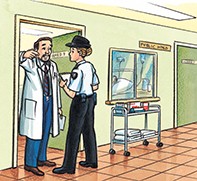Innocence revisited – 19
Before you criticise a colleague, step back and think again, as Dr Hill recalls.
Salad days
What precious days they were – those salad days we spent, newly qualified, in hospital. Time lends them a special distinction, an old-fashioned quaintness that grows with the years (until you get to my age when they sound totally archaic).
I was doing a short stint in an English industrial town famous for its carpets. David was my opposite number on the surgical side. It was Sister Whittaker, always taut and sharp, who labelled him for us. David had an unusually positive view of the world: it was etched starkly in black and white. One day Sister Whittaker was trying to tell him so. In the slight audacity of the moment her tongue stumbled over the words.
‘Oh, you are so dogmantic, Doctor,’ she exclaimed.
I happened to be present and chipped in quickly: ‘Sister means that you are a romantic dog!’
We all laughed. But, after that, led by Phyllida, we called him ‘Dog’ for the rest of his time with us.
Phyllida and I had been the only two ‘mature-age’ students at medical school. But whereas I was one by virtue of War service, Phyllida had a unique distinction: she had trained as a psychologist and had already earned her living in that big wide world out there. We were somewhat in awe of her. Our resident clown, Lachlan, doing the paediatric job, would whisper with a grin, ‘She knows exactly what you’re thinking!’
The Darling case
Over the Darling case Phyllida and Dog had a field day ... Mrs Darling had been admitted to my medical ward. Her GP’s letter had said:
Dear Doctor
Re: Mrs Shirley Darling, aged 41
?Pneumonia
Please see and oblige.
At lunch it was Dog who broached the subject.
‘Hey, I saw a policewoman in your ward. What’s up?’ he asked excitedly.
I had the floor and knew it.
‘Oh, just a case of pneumonia,’ I said airily.
Dog lifted the salt cellar and held it poised over my lunch.
‘The truth, Moriarty,’ he hissed.
So I told them...
Mrs Darling had looked white, shocked and infinitely tired. Her rapid breathing had struck me at first glance, but she had no cough, no fever, and her lungs seemed clear. With a dramatic gesture, Sister peeled back the bedclothes. Between the patient’s legs lay a ruptured umbilical cord. A pelvic mass rose nearly to the navel.
‘You’ve had a baby, Mrs Darling,’ I said.
‘Oh, no, Doctor, I’m not pregnant,’ she replied quickly.
Repeated questions elicited repeated denials. That hard, set, white face stared into mine. As we left the bedside, Sister took my arm and said, ‘You must ring the Police.’
Fending off the doctor
‘Fancy the GP not spotting that,’ Dog announced aggressively.
‘Dog,’ interrupted Phyllida, in the calm voice one uses with a child, ‘she rings her GP and asks for a home visit. The GP calls and finds her lying in bed. If he tries to examine her tummy, she pulls up the bedclothes saying “Please, Doctor, I’ve got a very heavy period” and in this way fends him off. Women have done this for centuries.’
‘All you have to do then is talk to her husband,’ Dog announced firmly, quite unabashed.
‘I did,’ I said.
‘And what did he say?’
‘He said “No, Doc, she’s not pregnant. I should know!”’
‘Well, I’m blowed.’ Dog blew out his cheeks.
The second round of questioning
It was Phyllida’s turn to attack over the evening meal.
‘Have you solved the mystery?’ she asked sweetly.
‘She probably had the baby at St Luke’s,’ Dog replied promptly, naming the maternity hospital half a mile away, ‘and in a state of shock or depression took herself home again.’
‘From the labour ward…in her nightie…she walked?’ Phyllida sounded disbelieving. ‘How far away do they live?’
She looked at me.
‘About a mile. Perhaps she taxied.’
‘She left the baby on the steps of St Luke’s then.’ This was Dog again.
‘Well, now you may be getting warmer,’ I said sadly.
The silencing truth
The truth, when it came, silenced us all. The bodies of twin boys were found in the bathroom of the Darling home. They appeared to have suffered head injuries. Mr Darling still professed total ignorance of the affair. His drawn, sad face looked into mine.
‘She works nights – yer see,’ he said, ‘and I’m on days.’ A well-known forensic pathologist conducted the postmortem, which I attended. At the end he peered at me over the rims of his glasses.
‘Always a heart-rending business,’ he commented, ‘and yet you wonder why it isn’t commoner than it is.’
Dog, of course, had to have the last word.
‘I still say the GP should have sussed out something,’ he said.
‘But you’re not going to be a GP, are you?’ Phyllida asked coquettishly, ‘you’re in for pathology!’
Lessons learned
As family doctors we are privileged spectators of the whole tragicomedy of life. When you think to criticise a colleague, step back and think again. MT

